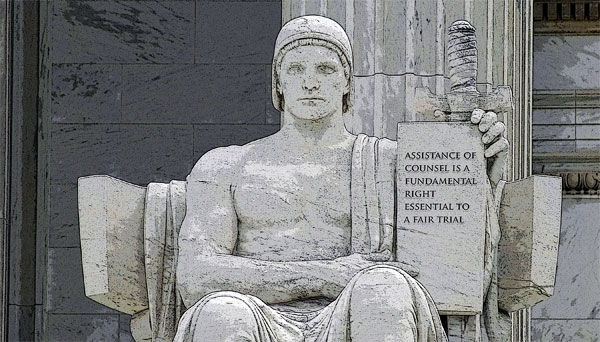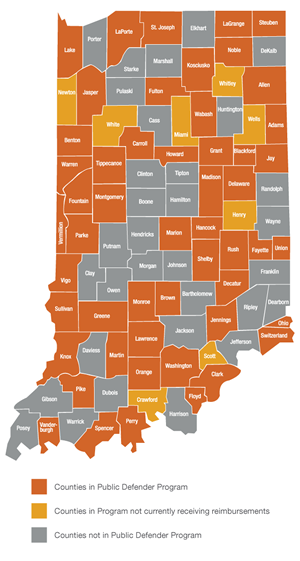
The Constitution of the United States and the Indiana Constitution require that indigent criminal and other defendants be provided adequate legal representation. In Indiana, the fiscal responsibility for this service falls primarily on county governments. In 2012, the total public defense costs in Indiana were in excess of $71 million. Through the state Indiana Public Defense Fund, counties receive partial reimbursement for their indigent defense expenses in felony and certain other cases if they meet statutory requirements and standards promulgated by the Indiana Public Defender Commission. Fifty-three counties participate in the program and are eligible for the reimbursement.
The reimbursement from the state’s Public Defense Fund is the only state level funding provided for indigent defense services. During fiscal years 2011/2012 and 2012/2013, the Indiana General Assembly appropriated $20 million to the Public Defense Fund for distribution to the counties. In the FY 2013/2015 biannual budget, the General Assembly increased the Public Defense Fund to $22 million. By way of comparison, in the FY 2013/2015 biannual budget the General Assembly appropriated $28,643,667 and $29,299,933 for chief and deputy prosecutors’ salaries and benefits for each of the budget years.

The Public Defense Fund was established to ease the counties’ burden of the costs associated with indigent defense legal representation in capital and other cases and to improve delivery of these services by requiring compliance with the Indiana Public Defender Commission’s Standards. State law authorizes all Indiana counties to receive reimbursements from the Public Defense Fund of 50% of expenditures for indigent defense services in capital cases when in compliance with Indiana Supreme Court Criminal Rule 24; and for eligible counties, reimbursement of up to 40% of expenditures in all other felony cases.
To be eligible for reimbursement of noncapital defense expenses, a county must adopt a comprehensive plan for the delivery of indigent defense services approved by the Commission and comply with standards adopted by the Commission as authorized by state statute. Approximately 67% of the state’s population resides in counties eligible for noncapital reimbursement.
The map at right indicates the counties that have opted to participate in the state public defender program.
The Legislature adopted a statute giving the “right to counsel” in CHINS (Children in Need of Services) and TPR (Termination of Parental Rights) cases, but did not provide state funds for these services, leaving the counties to bear the entire burden of the expense. The Indiana Public Defender Commission, which distributes the Public Defense Fund, has the authority to reimburse public defense expenses for CHINS/TPR cases, but has until now, as a matter of policy, deemed those expenses ineligible for reimbursement because the cost was prohibitive. The additional appropriation of $2 million will enable the Public Defense Fund to reimburse counties for CHINS/TPR cases.
Also, a rule amendment proposed and published for public comment by the Indiana Supreme Court Committee on Rules of Practice and Procedure calls for the presence of counsel, in open court, during all waivers of counsel by juvenile delinquency defendants. One of the concerns about adopting such an amendment is the possible increase in the number of public defender appointments in juvenile cases and the associated increased costs. The $2 million increase in the Public Defense Fund will provide some relief to participating counties if such an amendment is adopted.
The Public Defense Fund provides property tax relief to counties that participate in the reimbursement program; and a 40% return on noncapital defense costs is figured in each eligible county’s budget. The cost of public defense contrasted between counties that receive reimbursement and those that do not is reflected in a table: Indiana County Indigent Defense Systems (PDF).
In Webb v. Baird, (6 Ind. 13), the Indiana Supreme Court in 1853 recognized a right to an attorney at public expense for an indigent person accused of crime, grounded in “the principles of a civilized society,” not in constitutional or statutory law.
March 18, 2013 marked the fiftieth anniversary of the landmark U.S. Supreme Court decision, Gideon v. Wainwright, 372 U.S. 335 (1963), in which the Court unanimously declared that poor people accused of crimes are entitled to lawyers and that every person “stands equal before the law.”
The Court ruled that the Constitution’s Sixth Amendment gives a criminal defendant charged with a serious offense the right to counsel—even if the defendant cannot afford an attorney. That Amendment states “in all criminal prosecutions, the accused shall enjoy the right… to have the Assistance of Counsel for his defence.” In Gideon, the Court ruled that the Sixth and Fourteenth Amendments require states to provide defense attorneys to any indigent criminal defendant charged with a felony.